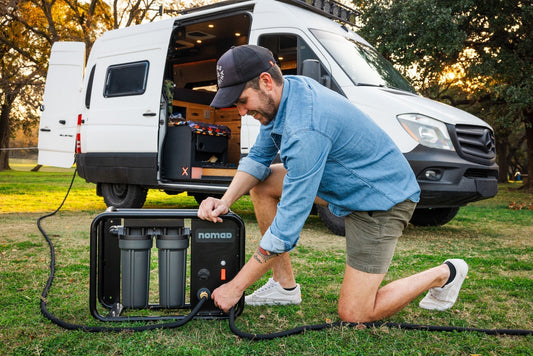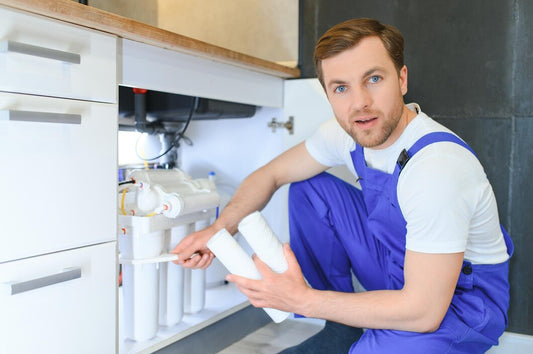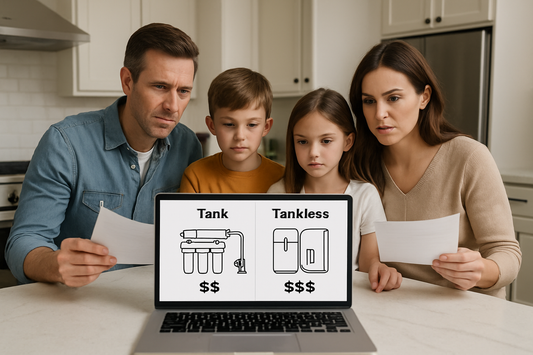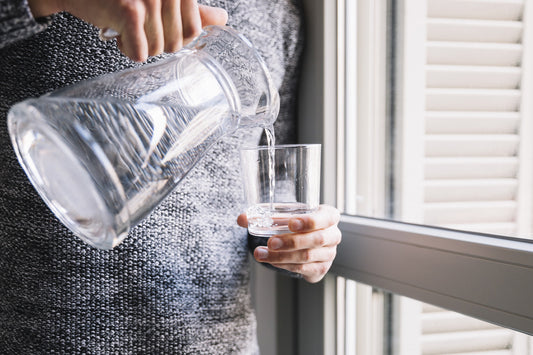Off-Grid Water Filtration Systems: Your Complete Survival Guide
Picture this: You're miles away from civilization, surrounded by nature's raw beauty, but your water tastes like it came from a swamp. Sound familiar? If you're serious about off-grid living, you've probably faced this exact scenario. The difference between thriving and merely surviving off the grid often comes down to one critical element: access to clean, safe water.
After helping thousands of families transition to sustainable living, I've seen the same water challenges surface again and again. The good news? Every single water problem has a solution. Whether you're dealing with funky-tasting well water, contaminated rainwater, or unreliable natural sources, the right off grid water filtration systems can transform your experience from constant worry to complete water freedom.
The Reality Check: Why Off-Grid Water Problems Are So Common
Let's be honest—municipal water has spoiled us. Turn a handle, and clean water flows. But when you're living off the grid, that safety net disappears. Suddenly, you're responsible for every drop that enters your body, and that responsibility can feel overwhelming.
The most common off-grid water challenges I encounter are:
Contaminated Surface Water: That crystal-clear mountain stream might harbor parasites, bacteria, or agricultural runoff that'll send you straight to the nearest emergency room.
Inconsistent Well Water Quality: Your well might produce great water one season and mineral-heavy, discolored water the next. Seasonal changes, nearby construction, or natural geological shifts can dramatically alter your water quality overnight.
Rainwater Contamination: Rainwater seems pure, but it picks up everything from your roof—bird droppings, dust, chemicals from roofing materials, and airborne pollutants. Without proper off grid water purification, you're basically drinking a cocktail of contaminants.
Storage-Related Issues: Even if your source water is pristine, improper storage can introduce algae, bacteria, and biofilm that'll make your water taste terrible and potentially make you sick.

The Game-Changer: Understanding Your Filtration Options
Here's where most people get overwhelmed. Walk into any outdoor store, and you'll see dozens of water filters, each claiming to be the "best." But here's the truth: there's no one-size-fits-all solution. Your ideal portable water filter for off grid living depends entirely on your specific situation, water sources, and lifestyle.
Multi-Stage Filtration: The Gold Standard
Think of water filtration like building a fortress—you want multiple layers of protection. The most effective off grid water filtration systems use a multi-stage approach:
Stage 1: Sediment Removal eliminates visible particles, sand, and debris that can clog your system and make water look unappetizing.
Stage 2: Carbon Filtration tackles chlorine, volatile organic compounds (VOCs), and improves taste and odor. This is where most people notice the biggest difference in water quality.
Stage 3: Advanced Purification handles the invisible threats—bacteria, viruses, heavy metals, and chemical contaminants that could seriously harm your health.
The Portable Solution That Changes Everything
For families who've struggled with complicated, expensive filtration systems, portable options have been a revelation. The ClearSource Nomad RV Water Filter represents exactly what off-grid living should be about—simplicity without compromise.
This isn't just another camping filter. It's a complete water treatment system that handles everything from questionable well water to collected rainwater. What makes it special is its ability to deliver municipal-quality water without the complexity of traditional whole-house systems.
Real-World Problem Solving
Let me share a story that illustrates why having the right system matters. Last summer, I helped a family in rural Montana whose well water had become increasingly problematic. They'd been buying bottled water for months—expensive and completely unsustainable for off grid living.
Their water tested positive for coliform bacteria, had high iron content, and frankly tasted awful. A simple portable filtration system transformed their situation in hours, not days. No plumbing modifications, no electrical requirements, just clean water whenever they needed it.
Troubleshooting Your Off-Grid Water Challenges
Problem: Water Tastes or Smells Bad
Immediate Solution: This usually indicates organic contamination or high mineral content. A quality carbon filter will eliminate most taste and odor issues immediately.
Long-term Strategy: Test your water source to identify the specific contaminants. Sulfur smell indicates hydrogen sulfide, which requires specialized treatment. Metallic taste suggests iron or copper, while earthy flavors often mean algae or organic matter.
Problem: Cloudy or Discolored Water
Immediate Solution: Never drink cloudy water. This indicates suspended particles or potential bacterial contamination. Always filter through at least a sediment filter before any other treatment.
Long-term Strategy: Cloudy water often means your storage system needs cleaning or your source has been compromised. Check your storage tanks for biofilm buildup and consider UV sterilization for ongoing protection.
Problem: Inconsistent Water Pressure or Flow
Immediate Solution: Check all filters for clogging. Most portable systems will slow down when filters need replacement, which actually protects you from contaminated water breakthrough.
Long-term Strategy: Establish a regular maintenance schedule. Most off-grid families find success with monthly filter inspections and quarterly deep cleaning of storage systems.

Image by wirestock
The Complete Off-Grid Water Strategy
Successfully living off the grid requires thinking beyond just filtration. You need a comprehensive water management approach:
Source Diversification: Never rely on a single water source. Combine well water, rainwater harvesting, and emergency storage to ensure consistent supply.
Quality Testing: Test your water quarterly, or immediately if you notice changes in taste, smell, or appearance. Simple home test kits can identify most common contaminants.
Storage Management: Clean storage tanks annually, use food-grade materials only, and consider adding UV sterilization for long-term storage situations.
Backup Planning: Have multiple filtration options available. A portable system can serve as your primary filter or backup system, depending on your setup.
Why Portable Systems Are Perfect for Modern Off-Grid Living
The beauty of high-quality portable filtration is its flexibility. Unlike fixed systems that require professional installation and significant investment, portable options let you:
- Adapt to changing conditions without major infrastructure changes
- Take your clean water anywhere on your property or during travel
- Start simple and expand as your off-grid setup evolves
- Maintain easily without specialized knowledge or tools
For families exploring water filtration systems for the first time, portable options remove the intimidation factor while delivering professional-grade results.
The Bottom Line: Water Security Equals Peace of Mind
How to survive living off the grid ultimately comes down to mastering the basics, and water sits at the top of that list. You can generate your own power, grow your own food, and build your own shelter, but without reliable access to clean water, none of that matters.
The families who thrive off-grid are those who've solved their water challenges early and comprehensively. They're not constantly worrying about whether their water is safe or rationing supplies during dry spells. Instead, they're focused on enjoying the freedom and independence that drew them to off grid living in the first place.
Your Next Steps
If you're currently struggling with water quality issues, start with testing. Know what you're dealing with before investing in any filtration system. Once you understand your specific challenges, choose a system that addresses your actual problems, not just the marketing claims.
Remember, the best off grid water purification system is the one you'll actually use consistently. Complicated systems that require constant maintenance often get neglected, leaving you right back where you started.
The path to water independence isn't about finding the perfect system—it's about finding the right system for your unique situation and using it consistently. With the right approach, clean water becomes one less thing to worry about, leaving you free to enjoy everything else that makes off-grid living so rewarding.





